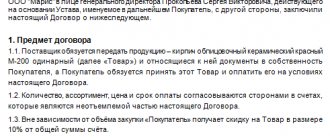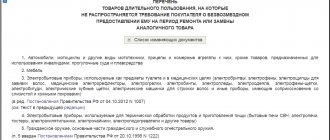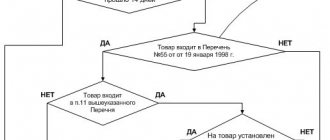Legislation
The provisions on penalties upon purchase are regulated by:
- Articles of the Civil Code:
- 330–333 contain general definitions (size, order of establishment, reduction in court);
- 487 describes the penalty in case of advance payment for goods. But these provisions do not apply to consumer relations, because POPP provides for different regulation;
- 521 establishes penalties for late delivery.
- The Law on the Protection of Consumer Rights regulates penalties for non-delivery of goods in the case of prepayment in Art. 23.1, including the rules on its size and calculation.
- Resolution of the Plenum of the Supreme Court of the Russian Federation dated June 28, 2012 No. 17 “On the consideration by courts of civil cases in disputes about PPP.” References are contained in paragraphs 31–34, which clarify the application of the provisions of the consumer protection law.
IMPORTANT: According to Article 506 of the Civil Code, supply provisions do not apply to relations between consumers and commercial organizations. Such an agreement is in the nature of a purchase and sale with delivery.
After this, there are three possible scenarios:
The supplier agrees to all requirements. In this case, he sends a letter to the customer stating his intention to pay the penalty, and transfers funds to the specified details.
The supplier agrees that he violated the delivery deadlines, but does not want to pay the penalty. The customer can recover it independently from a bank guarantee, if this is provided for in the document; in addition, there is the possibility of withholding a penalty from the funds transferred as security for the contract.
What is a penalty
A penalty (penalty) is a way to protect consumer rights and encourage the seller to fulfill obligations under the contract on time and with high quality. It is paid in a certain amount, calculated on the cost of goods, the price of work, services, etc. Usually expressed as a percentage.
Kinds
The Consumer Rights Protection Law provides for the existence of two types of penalties:
Dear readers! To solve your problem right now, get a free consultation
— contact the lawyer on duty in the online chat on the right or call: +7 (499) 938 6124 — Moscow and region.
+7 (812) 425 6761 — St. Petersburg and region. 8 (800) 350 8362 - Other regions of the Russian Federation You will not need to waste your time and nerves
- an experienced lawyer will solve all your problems!
- Legal, established PDA. This type cannot be canceled by agreement of the parties.
- Negotiable. Can be changed to the benefit of the buyer (i.e. the seller's liability will be higher).
The penalty for STD is punitive in nature, i.e. shall be recovered simultaneously with damages. They are not included in the penalty and are reimbursed in full.
IMPORTANT: if the amount of the penalty in the contract is less than that provided by law, then this provision of the document by virtue of Art. 16 of the RFP is considered invalid and the general rules apply.
Only part of the goods was delivered
Sometimes there are situations when the contract provides for one delivery, but in fact the goods are delivered in parts. If a prohibition on such actions is not specified in the contract, then the customer does not have the right to refuse acceptance of the goods. In this case, the shipment delivered without any complaints will have to be paid for.
When the supplier is late in delivering the remaining products, the customer must file a corresponding claim against him. In it, he may demand elimination of the violation and payment of a penalty or termination of the contract, if such a possibility is provided for in the text of the contract.
Penalty for late delivery of goods
The Law on the Protection of Consumer Rights provides for several amounts of penalties - from 0.5 to 3%. When calculating, the minimum value is taken into account, i.e. 0.5%.
According to the consumer protection law
According to Art. 23.1, the legal penalty is half a percent per day of the advance payment amount. Therefore, the formula is: 0.5% *a*b = x, where:
- a – preliminary amount (indicated in a check, receipt, or other document);
- b – number of overdue days;
- x – size (no more than prepayment).
For example, the buyer paid 1000 rubles. The delay period was 10 days, then the penalty for 1 day will be 5 rubles, and for 10 – 50 rubles.
There is uncertainty as to which days are taken into account for the penalty, i.e. Do weekends and holidays count? The Civil Code does not provide for regulation of this issue, therefore the rules of Art. 190 about calendar days. But the parties may establish in the contract a different calculation of the period for penalties, excluding holidays.
Under contract
Contractual penalty provisions may be included in the contract between buyer and seller. The main condition is that its value is not less than that established by law, i.e. 0.5% per day, and this is in writing.
According to the rules of the POPP, the penalty is collected from the day when the seller was supposed to deliver the products until the moment the item is transferred or the amount paid is returned to the buyer. But its value cannot be more than the advance payment.
IMPORTANT: according to paragraph 34 of the Plenum Resolution, the amount of the penalty is reduced in exceptional cases according to the rules of Article 333 of the Civil Code.
If the contract does not specify the delivery time, then in accordance with Art. 457 of the Civil Code, general provisions on obligations apply. Thus, Article 314 of the Civil Code states that delivery must be made within 7 days after the buyer’s request is presented.
Delay in delivery due to coronavirus: how to justify it correctly
Personal data privacy policy
This Personal Data Privacy Policy (hereinafter referred to as the Privacy Policy) applies to all information that the website of IP Zavgorodniy A.A., (hereinafter referred to as the Website of IP Zavgorodniy A.A.) located on a domain name (as well as its subdomains) can receive about the User while using the site (as well as its subdomains), its programs and its products.
Definition of terms 1.1 The following terms are used in this Privacy Policy: 1.1.1. “Site Administration” (hereinafter referred to as the Administration) - authorized employees to manage the website of IP Zavgorodniy A.A., acting on behalf of IP Zavgorodniy A.A., who organize and (or) carry out the processing of personal data, and also determine the purposes of processing personal data , composition of personal data to be processed, actions (operations) performed with personal data. 1.1.2. “Personal data” - any information relating to a directly or indirectly identified or identifiable individual (subject of personal data). 1.1.3. “Processing of personal data” - any action (operation) or set of actions (operations) performed using automation tools or without the use of such means with personal data, including collection, recording, systematization, accumulation, storage, clarification (updating, changing), extraction, use, transfer (distribution, provision, access), depersonalization, blocking, deletion, destruction of personal data. 1.1.4. “Confidentiality of personal data” is a requirement for the Operator or other person who has access to personal data to comply with the requirement not to allow their distribution without the consent of the subject of personal data or the presence of another legal basis. 1.1.5. "Website of IP Zavgorodniy A.A." is a collection of interconnected web pages located on the Internet at a unique address (URL): , as well as its subdomains. 1.1.6. “Subdomains” are pages or a set of pages located on third-level domains belonging to the website of IP Zavgorodniy A.A., as well as other temporary pages, at the bottom of which the contact information of the Administration is indicated 1.1.5. “User of the site IP Zavgorodniy A.A.” (hereinafter referred to as the User) - a person who has access to the website of IP Zavgorodniy A.A. via the Internet and uses information, materials and products of the site of IP Zavgorodniy A.A.. 1.1.7. “Cookies” are a small piece of data sent by a web server and stored on the user’s computer, which a web client or web browser sends to the web server each time in an HTTP request when an attempt is made to open a page on the corresponding site. 1.1.8. “IP address” is a unique network address of a node in a computer network through which the User gains access to the website of IP Zavgorodniy A.A. General provisions 2.1. Using the website of IP Zavgorodniy A.A. The User means agreement with this Privacy Policy and the terms of processing of the User’s personal data. 2.2. In case of disagreement with the terms of the Privacy Policy, the User must stop using the website of IP Zavgorodniy A.A.. 2.3. This Privacy Policy applies to the website of IP Zavgorodniy A.A. Website of IP Zavgorodniy A.A. does not control and is not responsible for third party websites, which the User can access via links available on the website of IP Zavgorodniy A.A. 2.4. The Administration does not verify the accuracy of the personal data provided by the User.
Subject of the privacy policy
3.1. This Privacy Policy establishes the Administration’s obligations to non-disclose and ensure a regime for protecting the confidentiality of personal data that the User provides at the Administration’s request when registering on the website of IP Zavgorodniy A.A., when subscribing to an e-mail newsletter or when placing an order. 3.2. Personal data permitted for processing under this Privacy Policy is provided by the User by filling out forms on the website of IP Zavgorodniy A.A. and include the following information: 3.2.1. Username; 3.2.2. User's contact phone number; 3.2.3. email address (e-mail) 3.3. Website of IP Zavgorodniy A.A. protects Data that is automatically transmitted when visiting pages: IP address information from cookies information about the browser access time referrer (address of the previous page). 3.3.1. Disabling cookies may result in the inability to access parts of the site that require authorization. 3.3.2. Website of IP Zavgorodniy A.A. collects statistics about the IP addresses of its visitors. This information is used to prevent, identify and resolve technical problems. 3.4. Any other personal information not specified above (visit history, browsers used, operating systems, etc.) is subject to secure storage and non-distribution, except for the cases provided for in paragraphs. 5.2. and 5.3. of this Privacy Policy.
Purposes for collecting user personal information
4.1. The Administration may use the User’s personal data for the following purposes: 4.1.1. Identification of the User registered on the website of IP Zavgorodniy A.A for his further authorization, placing an order and other actions. 4.1.2. Providing the User with access to personalized data from the website of IP Zavgorodniy A.A.. 4.1.3. Establishing feedback with the User, including sending notifications, requests regarding the use of the website of IP Zavgorodniy A.A., providing services and processing requests and applications from the User. 4.1.4. Determining the location of the User to ensure security and prevent fraud. 4.1.5. Confirmation of the accuracy and completeness of personal data provided by the User. 4.1.6. Creating an account to use parts of the website of IP Zavgorodniy A.A., if the User has agreed to create an account. 4.1.7. Notifications to the User by email. 4.1.8. Providing the User with effective technical support if problems arise related to the use of the website of IP Zavgorodniy A.A.. 4.1.9. Providing the User, with his consent, with special offers, information on prices, newsletters and other information on behalf of the website of IP Zavgorodniy A.A.. 4.1.10. Carrying out advertising activities with the consent of the User.
Methods and terms for processing personal information
5.1. The processing of the User's personal data is carried out without a time limit, in any legal way, including in personal data information systems using automation tools or without the use of such tools. 5.2. The User agrees that the Administration has the right to transfer personal data to third parties, in particular, courier services, postal organizations (including electronic), telecommunication operators, solely for the purpose of fulfilling the User’s order placed on the website of IP Zavgorodniy A.A., including delivery of Products, documentation or e-mail messages. 5.3. The User's personal data may be transferred to authorized government bodies of the Russian Federation only on the grounds and in the manner established by the legislation of the Russian Federation. 5.4. In the event of loss or disclosure of personal data, the Administration has the right not to inform the User about the loss or disclosure of personal data. 5.5. The Administration takes the necessary organizational and technical measures to protect the User’s personal information from unauthorized or accidental access, destruction, modification, blocking, copying, distribution, as well as from other unlawful actions of third parties. 5.6. The Administration, together with the User, takes all necessary measures to prevent losses or other negative consequences caused by the loss or disclosure of the User’s personal data.
Rights and obligations of the parties
6.1. The user has the right: 6.1.1. Make a free decision to provide your personal data necessary to use the website of IP Zavgorodniy A.A., and give consent to their processing. 6.1.2. Update, supplement the provided information about personal data if this information changes. 6.1.3. The user has the right to receive from the Administration information regarding the processing of his personal data, unless such right is limited in accordance with federal laws. The user has the right to demand from the Administration clarification of his personal data, blocking or destruction of it if the personal data is incomplete, outdated, inaccurate, illegally obtained or is not necessary for the stated purpose of processing, as well as take measures provided by law to protect his rights. 6.2. The administration is obliged to: 6.2.1. Use the information received solely for the purposes specified in clause 4 of this Privacy Policy. 6.2.2. Ensure that confidential information is kept secret, not disclosed without the prior written permission of the User, and also not sell, exchange, publish, or disclose in other possible ways the transferred personal data of the User, with the exception of paragraphs. 5.2 and 5.3. of this Privacy Policy. 6.2.3. Take precautions to protect the confidentiality of the User's personal data in accordance with the procedure usually used to protect this type of information in existing business transactions. 6.2.4. Block personal data relating to the relevant User from the moment of application or request from the User, or his legal representative or the authorized body for the protection of the rights of personal data subjects for the period of verification, in the event of detection of unreliable personal data or unlawful actions.
Responsibility of the parties
7.1. The Administration, which has not fulfilled its obligations, is responsible for losses incurred by the User in connection with the unlawful use of personal data, in accordance with the legislation of the Russian Federation, except for the cases provided for in paragraphs. 5.2., 5.3. and 7.2. of this Privacy Policy. 7.2. In case of loss or disclosure of Confidential Information, the Administration is not responsible if this confidential information: 7.2.1. Became public domain until it was lost or disclosed. 7.2.2. Was received from a third party before it was received by the Resource Administration. 7.2.3. Was disclosed with the consent of the User. 7.3. The user bears full responsibility for compliance with the requirements of the legislation of the Russian Federation, including laws on advertising, on the protection of copyright and related rights, on the protection of trademarks and service marks, but not limited to the above, including full responsibility for the content and form of materials. 7.4. The user acknowledges that responsibility for any information (including, but not limited to: data files, texts, etc.) to which he may have access as part of the website of IP Zavgorodniy A.A. lies with the person who provided such information. 7.5. The User agrees that the information provided to him as part of the website of IP Zavgorodniy A.A. may be an object of intellectual property, the rights to which are protected and belong to other Users, partners or advertisers who post such information on the website of IP Zavgorodniy A.A.. The User may not modify, rent, loan, sell, distribute or create derivative works based on such Content (in whole or in part), unless such actions have been expressly authorized in writing by the owners of such Content in accordance with terms of a separate agreement. 7.6. In relation to text materials (articles, publications that are in free public access on the website of IP Zavgorodniy A.A.), their distribution is permitted provided that a link is given to the Website of IP Zavgorodniy A.A.. 7.7. The Administration is not liable to the User for any loss or damage incurred by the User as a result of the deletion, failure or inability to save any Content and other communication data contained on the website of IP Zavgorodniy A.A or transmitted through it. 7.8. The administration is not responsible for any direct or indirect losses resulting from: the use or inability to use the site or individual services; unauthorized access to the User's communications; statements or conduct of any third party on the Site. 7.9. The administration is not responsible for any information posted by the user on the website of IP Zavgorodniy A.A., including, but not limited to: information protected by copyright, without the express consent of the copyright owner.
Dispute Resolution
8.1. Before filing a claim in court regarding disputes arising from the relationship between the User and the Administration, it is mandatory to submit a claim (a written proposal or an electronic proposal for a voluntary settlement of the dispute). 8.2. The recipient of the claim, within 30 calendar days from the date of receipt of the claim, notifies the claimant in writing or electronically of the results of consideration of the claim. 8.3. If an agreement is not reached, the dispute will be referred to the Moscow Arbitration Court. 8.4. The current legislation of the Russian Federation applies to this Privacy Policy and the relationship between the User and the Administration.
Additional terms and conditions
9.1. The Administration has the right to make changes to this Privacy Policy without the User’s consent. 9.2. The new Privacy Policy comes into force from the moment it is posted on the website of IP Zavgorodniy A.A., unless otherwise provided by the new edition of the Privacy Policy. 9.3. All suggestions or questions regarding this Privacy Policy should be reported to: 9.4. The current Privacy Policy is available on the page at Updated: January 24, 2021 Main office in Moscow, IP Zavgorodniy A.A., Butyrsky Val, building 5, office 511 Representative office in St. Petersburg, IP Zavgorodniy A.A. , Baseinaya, building 21a, office 711
What to do if delivery deadlines are missed
Delivery times for paid goods under the POZPP are specified in the contract and are determined by a calendar date.
The buyer has the right to file a claim for non-delivery of the item within the prescribed period and demand the fulfillment of one of these conditions. In both cases, he must be compensated for losses.
The seller is obliged to satisfy legal demands within 10 days. If he has not fulfilled them, then the consumer can file a claim in court according to the rules of the Civil Procedure Code.
Violation of delivery deadlines (Article 23.1) is the basis for:
- the seller becomes obligated to deliver the products by agreeing on a new date with the buyer;
- return of money paid and termination of the contract.
How do company sales depend on the speed and quality of deliveries?
Our sales depend directly on delivery times. In industry, the customer needs three things: quality, good price and acceptable deadlines. And we must meet all these criteria. If a company cannot provide adequate delivery times, its credibility will diminish, as will the number of orders.
Let's assume that the counterparty let us down, as a result of which we did not receive components for the power plant. This means that all other parts for the unit are “frozen” in the warehouse. And then the consequences come one after another: the rhythm of production is disrupted, the client delays payment, we do not ship products on time, financial indicators collapse. Added to all this is a hole in the image, which no official letters explaining the reasons will close. It is quite difficult to measure all these losses in absolute numbers. But it is clear that they are frighteningly large. For example, just one problematic delivery last year reduced the number of products produced per month by exactly half. We have completed 60 installations, although we can easily complete 120.
Is it possible to recover losses?
Losses are the costs of restoring a violated right (the difference in price between products when the buyer was forced to refuse the item due to delay and buy a more expensive product in another store).
Losses are compensated along with satisfaction of claims arising due to violation of the terms of the contract by the seller. At the same time, they are compensated both voluntarily and in court.
Article 22 of the POPL states that the buyer’s claims for damages are satisfied within 10 days from the date of filing the claim.
If the delivery time is not met, the buyer has the right to demand full compensation.
IMPORTANT: the condition for damages must be included in the content of the claim and justified.
Examples of recommended wording of the terms of a supply agreement
The supply contract should indicate the criteria under which the conditions that arise will be considered force majeure. You can name these conditions - for example, stipulate in the contract that restrictions imposed by the authorities due to the spread of infection are recognized as force majeure within the framework of a specific contract. You can describe these restrictions - in this case, the agreement specifies only those circumstances that affect the activities of a particular contractor.
For example, the delivery time for doors cannot be extended due to the fact that the authorities will prohibit visiting public places at certain times. But if the legislator prohibits trade relations with the country in which materials or components for such doors are produced, an increase in delivery time due to coronavirus will not be considered a failure to comply with contractual obligations.
An example of wording applicable in this case might look like this:
Restrictions imposed by the Russian Federation and other countries in connection with the spread of coronavirus infection are considered force majeure. A party has the right to refer to the impact of force majeure circumstances if it directly and directly resulted in the impossibility of fulfilling the terms of the contract.
If you want to maintain supplier liability even during a pandemic
The opposite situation also happens when the parties do not want coronavirus restrictions to be considered force majeure within the framework of the contract. Under such conditions, fines for failure to meet delivery deadlines during a pandemic are collected in the usual manner - no relief is provided to the contractor. In this case, the text of the agreement should include the following condition:
The agreement is concluded and subject to execution in the context of the spread of coronavirus infection. The parties agreed that, in relation to the terms of the contract, restrictions related to the spread of coronavirus infection are not force majeure circumstances in the sense provided for in paragraph 3 of Art. 401 Civil Code of the Russian Federation.
Methods for selling furniture
2 ways to sell furniture - by samples or remotely.
The current legislation does not establish any prohibitions on the method of selling goods, that is, it does not limit the seller (manufacturer) to use any method to sell the furniture he produces. We will highlight the main and probably the most popular ways of selling furniture:
- sale of furniture by samples - involves direct familiarization of the consumer with the purchased product, which is located at the point of sale. The place of sale means showrooms, shops and other sites (Part 1 of Article 497 of the Civil Code of the Russian Federation, Decree of the Government of the Russian Federation of July 21, 1997 No. 918 “On approval of the rules for the sale of goods based on samples”)
- remote method of selling furniture - involves selling without direct familiarization of the consumer with furniture or its samples when concluding a purchase and sale agreement, including through booklets, catalogs, online stores, etc. (clause 2 of article 497)
Formula for calculating penalties under Article 23.1 of the Law on the Protection of Consumer Rights
Prepayment amount * 0.5% (0.005) * number of days overdue
- Prepayment amount - only that part of the cost of the goods that was paid in advance is taken, i.e. before delivery of the goods. You can take all amounts deposited in cash, by card, or by credit. For example, if a sofa costs 30,000 rubles, but according to the contract the advance payment is only 15,000 rubles, you need to calculate the penalty from 15,000 rubles.
- Number of days of delay - all calendar days in a row are taken, starting from the next day after the date on which the contract was supposed to deliver. The penalty can be accrued on the day of actual delivery of the goods or on the day of return of the advance payment (inclusive) - depending on what you require in the claim.
- The maximum amount of the penalty under Article 23.1 of the Law of the Russian Federation is limited to the amount of the prepayment. That is, if during the calculation the penalty turns out to be more than the prepayment, its amount will be the same as the prepayment. For example: 30,000 rubles * 0.005 * 222 days = 33,300 rubles. This is more than the prepayment, so the penalty is 30,000 rubles.









